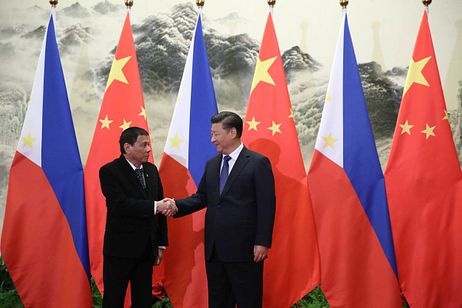China’s recent disclosure of a supposed secret agreement from 2016 with former Philippine President Rodrigo Roa Duterte has stirred controversy. The agreement reportedly involved the transfer of significant rights to China regarding Scarborough Island. While it allowed the Philippines limited fishing rights around the islands, it also imposed restrictions on military and official vessels within territorial waters.
This move by China appears to be part of its broader strategy to assert control over the South China Sea, with Scarborough Island being a focal point. However, China’s efforts to gain international support through this agreement are doubtful, given the contentious nature of the South China Sea disputes. Duterte has vehemently denied the existence of any secret agreement. Nevertheless, China’s assertion that the agreement was unwritten raises questions about the credibility of Beijing’s claims and the validity of its actions in the region. The US continues to deploy its ships in the South China Sea as part of its freedom of navigation.
China’s recent assertion of the existence of an informal agreement dating back to 2016 with the Philippines regarding the South China Sea islands has ignited concerns about escalating tensions in the already contentious region. The revelation comes amid ongoing confrontations involving water cannons between the two nations, further heightening the stakes. Reportedly, the agreement allowed for limited fishing rights but imposed strict restrictions on military access within territorial waters. President Ferdinand Marcos Jr. and his predecessor have vehemently refuted any such agreement compromising Philippine sovereignty, highlighting the absence of formal documentation.
Speculation surrounding Duterte’s past visit to Beijing has fuelled suspicions of such an agreement, though specific details remain elusive. Duterte’s warm relations with Chinese President Xi Jinping further fuel suspicions of a clandestine agreement between the two leaders. Marcos has disavowed any knowledge of such an agreement, emphasizing its invalidity and contravention of the 1987 Philippine constitution, which mandates impeachment for secrecy.
Marcos has distanced himself from any knowledge of such an arrangement, casting doubts on its legitimacy and constitutionality under Philippine law, as a secret agreement doesn’t give its provision the required legitimacy for its applicability. The Philippine government, under the scrutiny of House Speaker Ferdinand Martin Romualdez, is now scrutinizing what is referred to as a “gentleman’s agreement”, a gentleman’s agreement that is always official and written, which in this case, is not, casting doubts over China’s remarks.
Furthermore, China’s claims regarding the removal of a navy ship grounded in the Second Thomas Shoal are contested by Manila.
While Duterte aimed to maintain the “status quo” in the disputed waters to prevent conflict, any transfer of sovereignty was not endorsed. The notion of a “gentleman’s agreement” is now under scrutiny by House Speaker Ferdinand Martin Romualdez. Additionally, China’s claims regarding the removal of a navy ship grounded in the Second Thomas Shoal have been refuted by Manila, leading to accusations of violations by China.
Multiple nations, including Vietnam, Japan, Malaysia, and Taiwan, have overlapping claims in the resource-rich South China Sea, challenging China’s assertions over Scarborough Island and the surrounding waters. Despite a 2016 international arbitration ruling against its expansive claims, China has refused to acknowledge it. Skirmishes between China and the Philippines have intensified, with the Chinese coast guard damaging Philippine vessels. The United States has conducted freedom of navigation operations in the South China Sea and pledged to defend the Philippines against armed aggression. As tensions persist among China, the Philippines, and other claimant states, the South China Sea remains a highly contentious geopolitical hotspot.
To conclude, it is evident that China is now attempting to employ a new strategy to assert its dominance in the South China Sea by creating its own rules and pressing others to adhere to them. This move is particularly aimed at countering the United States’ Freedom of Navigation operations, which challenge China’s extensive maritime claims. The revelation of this supposed 2016 agreement with the Philippines can also be seen as a response to China’s rejection of the 2016 International Court of Justice ruling in The Hague, which invalidated China’s expansive territorial claims on historical grounds.
The once strong alliance between President Ferdinand Marcos Jr. and former President Rodrigo Duterte is now flaring up, with both leaders publicly criticizing and condemning each other on various occasions. This incident has provided Marcos with an opportunity to attack Duterte for allegedly compromising national security and sovereignty by supposedly making secret agreements with China. Duterte’s alleged informal agreement with Chinese President Xi Jinping has been a focal point of this dispute, as it raises questions about the integrity and transparency of the previous administration’s dealings with China. As a result, tensions within the Philippine political landscape have intensified, further complicating the geopolitical dynamics in the region.








